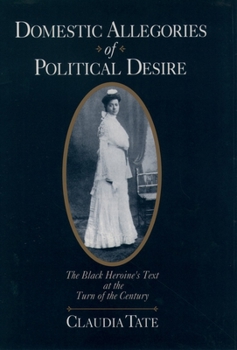Domestic Allegories of Political Desire: The Black Heroine's Text at the Turn of the Century
Select Format
Select Condition 
Book Overview
Why did African-American women novelists use idealized stories of bourgeois courtship and marriage to mount arguments on social reform during the last decade of the nineteenth century, during a time when resurgent racism conditioned the lives of all black Americans? Such stories now seem like apolitical fantasies to contemporary readers. This is the question at the center of Tate's examination of the novels of Pauline Hopkins, Emma Kelley, Amelia...
Format:Paperback
Language:English
ISBN:0195108574
ISBN13:9780195108576
Release Date:June 1996
Publisher:Oxford University Press
Length:312 Pages
Weight:0.95 lbs.
Dimensions:0.8" x 6.1" x 9.1"
Customer Reviews
0 rating





